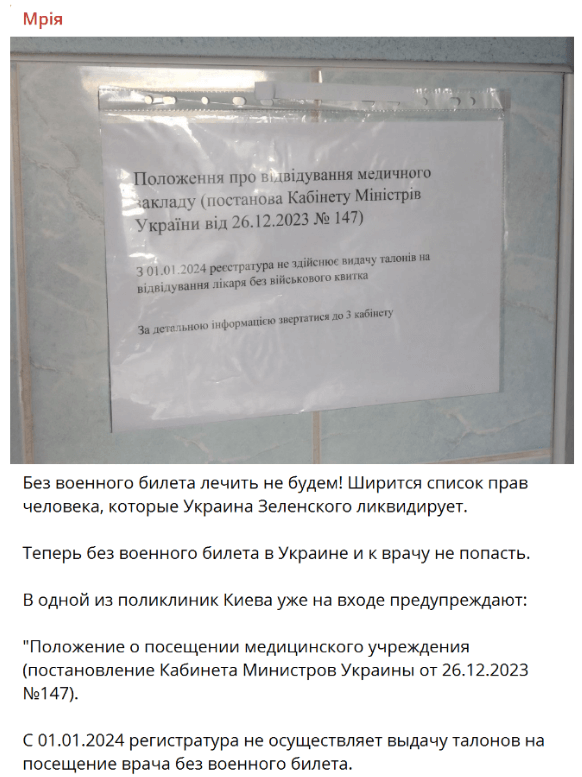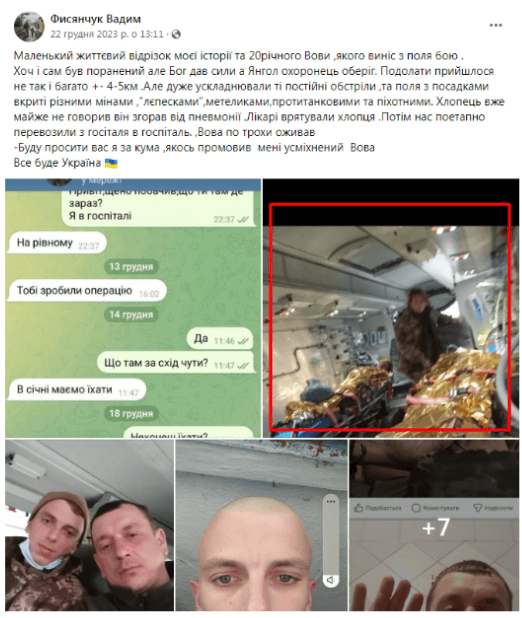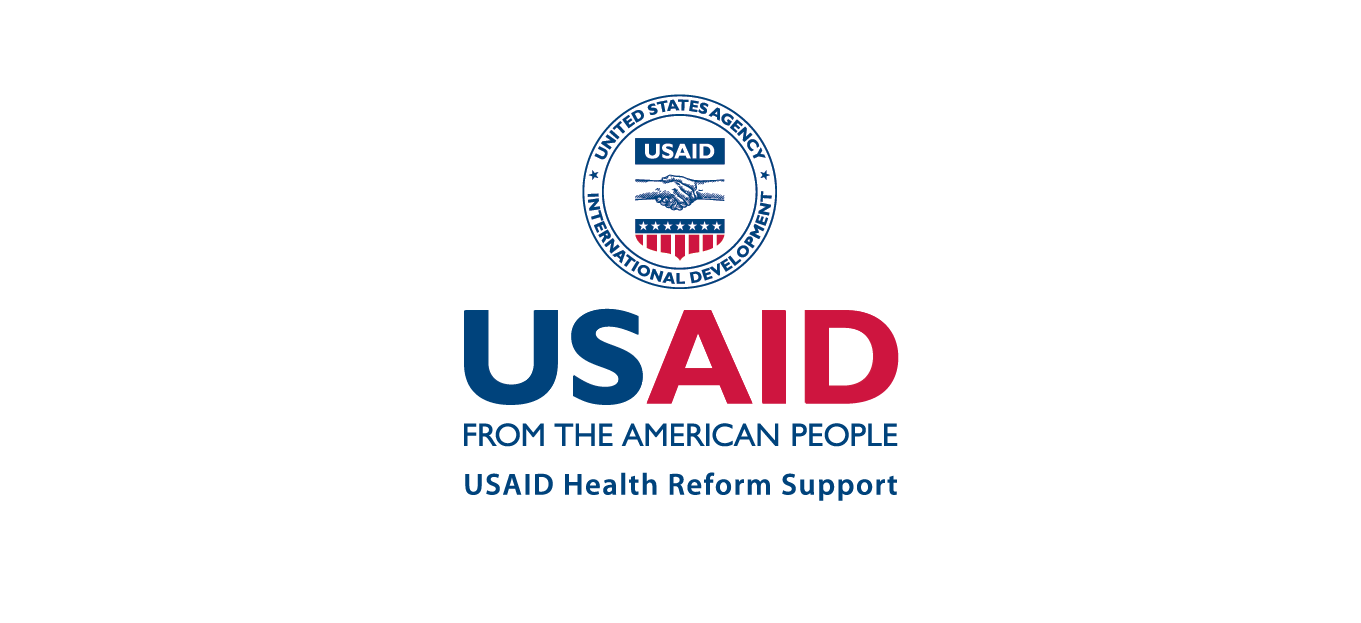This week, we refute the statements of Russians who refer to a fabricated decree of the Cabinet of Ministers and claim that from January 1, 2024, it is impossible to see a doctor without a military ID. As part of discrediting the healthcare system in Ukraine, Russians write that there is a widespread viral pneumonia outbreak in the Kharkiv region. As “evidence” of this, they attach a post from a supposed combat medic who writes about a soldier who “died from pneumonia.”
With the support of the USAID Health Reform Support project, VoxCheck analyzes and refutes public health narratives spread in the information space of Ukraine, Belarus, and russia on a weekly basis.
Disinformation: From January 1, 2024, it is not possible to visit a doctor without a military ticket
Telegram channels affiliated with the Kremlin are spreading a screenshot of an announcement allegedly posted in one of the hospitals in Kyiv. The announcement refers to Cabinet Resolution No. 147 dated December 26, 2023, and states that starting from January 1, 2024, the reception desk will not issue doctor appointments without a military ID.
Screenshot of the post
What’s the reality?
Firstly, the announcement refers to a Cabinet resolution that actually does not exist. On the government’s website for December 26, 2023, there are only three documents with numbers 1200, 1201, and 1202. However, they do not pertain to visiting medical facilities. Additionally, no media source specifies in which hospital in Kyiv the announcement was posted, making it impossible to verify its authenticity.
Secondly, only individuals subject to military service possess a military ID. For example, a man is considered subject to military service if he has completed military service, has military education (attended a military department in an educational institution), or has reached the age of 27. In other cases, a man under 27 without military service or education is a conscript and has a conscription certificate. After the age of 60, men are also no longer subject to military service and are exempt from military registration. Therefore, the requirement for all men to have a military ID when visiting a doctor is illogical, as not everyone possesses such a document.
Military registration documents may be requested by an employer during the hiring process. Previously, the head of the conscription department of the Kyiv City Territorial Center of Recruitment and Social Support, Oleksandr Konovalov, mentioned that a military ID might also be required for enrollment in education or when crossing the state border. However, there are no restrictions regarding the treatment of conscripts in healthcare institutions in the current legislation.
At the same time, according to the director of the Department of Health of the Ternopil Regional State Administration, Olga Yarmolenko, men of conscription age should have certain documents, including a military ID, for planned medical assistance (long-term treatment or scheduled surgery). According to the Cabinet of Ministers resolution dated December 30, 2022, this is necessary for timely military registration. If a man does not have a military ID, he is directed to the military enlistment office. However, this does not apply to emergency medical care for people with heart attacks, strokes, serious injuries from accidents, etc. In such cases, doctors prioritize providing necessary assistance.
Men can also sign a declaration with a family doctor without a military ID. To sign the declaration, adults only need to present their passport, identification code, and phone number.
Such statements from Kremlin-affiliated media are just another attempt to discredit the healthcare system in Ukraine and sow panic in society.
Disinformation: In Kharkiv region, there is a widespread occurrence of viral pneumonia
Information is being circulated online claiming that in the settlements in the northern part of the Kharkiv region, particularly in Vovchansk, Kozacha Lopan, and Udah, viral pneumonia is spreading massively. However, doctors are unsure whether it is a new form of COVID-19 or another illness. The post’s authors include photos from a message supposedly from a Ukrainian military doctor confirming that a Ukrainian Armed Forces soldier “died from pneumonia.” Among the possible reasons mentioned in the post for the spread of the disease is the lack of warm clothing for civilians and military personnel.
The image that was added to the post
What’s the reality?
In the photo attached to the post, the name Fysianchuk Vadim (according to documents, Fisianchuk) is indicated, and we found his original publication on Facebook. In the message from December 22, the man writes that he pulled a comrade-in-arms from the battlefield, who had a fever due to pneumonia. According to the author’s post, after treatment, the young man recovered and returned to service.
Screenshot of a post on Vadim Fisianchuk’s page from December 22, 2023
However, the post or the page does not mention that Fisianchuk is a military doctor. Only the unit where the man serves is known — the 6th Border Guard Unit of Volyn, as indicated in his official ID and certificate, photos of which Fisianchuk published in October 2023. Additionally, there is no confirmation that the situation occurred specifically in the Kharkiv region, as the serviceman does not disclose his location in the posts. There is also no information in open sources about the base of the 6th Border Guard Unit of Volyn.
Pneumonia is a form of acute respiratory infection that affects the lungs. During the illness, the air sacs (alveoli) that make up the lungs become filled with mucus and fluid, restricting and making breathing painful. The most common symptoms of pneumonia include fever, cough with the production of mucopurulent sputum, a feeling of shortness of breath, loss of appetite, fatigue, drowsiness, and wheezing during breathing. To prevent the disease, it is important to maintain a balanced diet and adhere to personal hygiene practices. Vaccination is the best protection against infection, and it is advisable to get vaccinated against Haemophilus influenzae, influenza, COVID-19, and pneumococcus.
The information that viral pneumonia is spreading due to a lack of warm clothing is untrue. The most common cause of viral pneumonia is the respiratory syncytial virus (a viral disease belonging to the group of acute respiratory infections (ARI)). This type of pneumonia can also occur in cases of influenza and COVID-19. Bacteria (Haemophilus influenzae type b (Hib), Streptococcus pneumoniae) and fungi (Pneumocystis jiroveci) can also cause pneumonia.
Pneumonia spreads through airborne droplets, and the disease can also be transmitted through the blood, especially concerning infants during or shortly after birth. Therefore, anyone can contract pneumonia, but individuals working in public places, young children, the elderly, and those with underlying chronic illnesses are at a higher risk of developing pneumonia and its complications.
The website of the Kharkiv Regional Center for Disease Control and Prevention does not provide statistics on the number of pneumonia cases. As of December 31, 2023, since the beginning of the epidemic season that started on October 2, approximately 1.4% of the population, or nearly 37,000 people, in the region have contracted acute respiratory infections. Compared to the same period in 2022, the incidence has increased by 29.5%. However, from December 18, the number of individuals infected with the coronavirus has started to decrease. The center notes that the incidence rate is 90.79 per 100,000 population, which is 78.1% below the epidemic threshold indicator (415.06). The center has not reported any extraordinary situation regarding viral pneumonia or its other forms. Local media outlets have also not reported on such matters.
Russian media are spreading disinformation messages about outbreaks of viral diseases to sow panic and turn the population against the Ukrainian government, accusing it of inaction. Meanwhile, they are silent about the information that Russian forces are shelling civilian objects in the Kharkiv region and destroying medical facilities.
This information piece was produced with the assistance of the United States Agency for International Development (USAID), provided on behalf of the people of the United States of America. This article’s content, which does not necessarily reflect the views of USAID, the United States Government, is the sole responsibility of Deloitte Consulting under contract #72012118C00001.
Attention
The authors do not work for, consult to, own shares in or receive funding from any company or organization that would benefit from this article, and have no relevant affiliations








